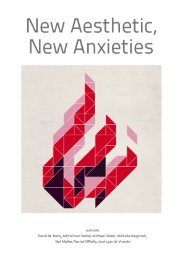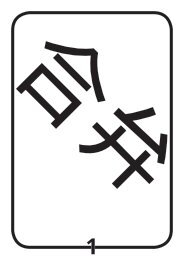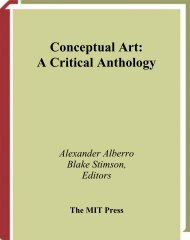You also want an ePaper? Increase the reach of your titles
YUMPU automatically turns print PDFs into web optimized ePapers that Google loves.
very precise - example will help to make this clear: recent research U.-P.<br />
Vernant)' has demonstrated the constitutively ambiguous nature of Greek<br />
tragedy. its texts being woven from words with double meanings that each<br />
character understands unilaterally (this perpetual misunderstanding is exactly<br />
the 'tragic'); there is, however, someone who understands each word in its<br />
duplicity and who, in addition, hears the very deafness of the characters<br />
speaking in front of him - this Someone being precisely the reader (or here the<br />
listener). Thus is revealed the total existence of writing: a text is made of<br />
multiple writings, drawn from many cultures and entering into mutual relations<br />
of dialogue, parody, contestation, but there is one place where this multiplicity<br />
is focused and that place is the reader, not, as was hitherto said, the author. The<br />
reader is the space on which all the quotations that make up a writing are<br />
inscribed without any of them being lost; a text's unity lies not in its origin but<br />
in its destination. Yetthis destination cannot any longer be personal: the reader<br />
is without history, biography, psychology; he is simply that someone who holds<br />
together in a single field all the traces by which the written text is constituted.<br />
Which is why it is derisory to condemn the new writing in the name of a<br />
humanism hypocritically turned champion of the reader's rights. Classic<br />
criticism has never paid any attention to the reader; for it, the writer is the only<br />
person in literature. We are nOw beginning to let ourselves be fooled no longer<br />
by the arrogant antiphrastical recriminations of good society in favour of the<br />
very thing it sets aside, ignores, smothers or destroys; we l{now that to give<br />
writing its future, it is necessary to overthrow the myth: the birth of the reader<br />
must be at the cost of the death of the Author.<br />
See Jean-Pierre Vernant, with Pierre Vidal-Naquet, My the et l'ragedie en Grece ancienne (Paris<br />
1972). especially pages 19-40; 99-131. [Translator]<br />
Roland Barthes, 'La mort de ['auteur', Manteia, V (PariS, 1968); trans. 'The Death of the Author', in<br />
Roland Barthes, Image - MUsic - Text, ed. and trans. Stephen Heath (New York: Hill & Wang/london:<br />
Fontana, 1977) 142-8.<br />
Barthes/ jThe Death of the Author! /45








